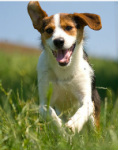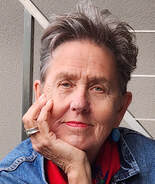I watch as a young dog, tongue flying, launches herself off the pavement and into the path of an oncoming car. Suspended in mid-leap she embodies all that so delights us about dogs: an aliveness to every fresh-minted, fresh-scented moment, unencumbered by fear of the future, or regret for the past.

I’m on volunteer door-duty extracting $2 from adults, waving children in for free. The money goes into a plastic container which once held hokey pokey ice-cream. The smell of fresh muffins wafts from the hall kitchen. One child arrives dressed as a very un-ferocious tiger. Another child is a wood nymph with a circlet of flowers on her head. How lovely the day is.
But the dog is dead. Her body’s been laid down, off the road and out of sight. There’s blood congealing in a pool on the bitumen. A woman flings water on the road and scrubs at the blood with a broom. She is trying to wash the blood away before the dog’s young owner sees it. Jacob, she tells me, was given the dog for his 14th birthday two weeks ago. He said she was the best present he’d ever had. Two women arrive and lift something heavy and inert in a blanket and lay it onto the back of a ute. Very gently.
For the rest of the morning I try to talk myself out of feeling so heartsick. It was a dog I tell myself, how much worse if it had been a child. It happened quickly. The dog wouldn’t have felt a thing. The boy only had a fortnight to fall in love with the dog. Maybe this will mean the death will hurt him less. And anyway, all kinds of animals get bowled over every day. As if to prove it, a pukeko dashes recklessly in front of my car as I drive homeward, passing the flattened corpse of a possum on the road.
When I get home my own dog greets me with a shimmy of delight and I search out a dimly-remembered poem about a dog dying. It’s by Bruce Weigl about having his sick, beloved dog put down. Here I find a dog’s death given its proper gravitas:“there was no cry or growl/only the weight of her in my arms/and then on the world.”
 RSS Feed
RSS Feed

